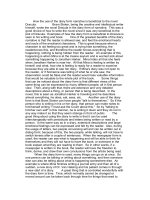Has the media paid too much attention to celebritie5
Bạn đang xem bản rút gọn của tài liệu. Xem và tải ngay bản đầy đủ của tài liệu tại đây (50.76 KB, 2 trang )
Has the media paid too much attention to celebrities?
Though we know about famous people`s lives through television,
newspaper, magazines, and other media for our interests, what
would the famous people feel about it? I believe that the media have
a responsibility to present a balanced view of the world, as well as
respect the lives of public figures. Therefore, I agree with that the
media pay too much attention to the personal lives of famous
people. For people who like to have a hand in the lives of public
figures there are some forms of media devoted exclusively to this
topic. They can satisfy their curiosity by buying fan magazines and
watching TV shows devoted to entertainment news. However, the
media should respect the privacy of every individual, including
public figures; otherwise the individuals would be harmed by the
media, for instance, John Lennon and Princess Diana, were hounded
out of the country and met violent deaths abroad. Thus, they may
have chosen to be in the public eye, but that does not give the public
the right to know everything about them. Moreover, many stories
about celebrities are untrue therefore those are unfair to the famous
and mislead the public. Fame does not trump privacy completely.
Yes, however, imply many in the media, who cite a public "right to
know" or, less grandly, claim that, having invited publicity to
achieve fame, the famous trade privacy for fame`s benefits. A more
nuance discussion is surely required. A first step would be for the
media to consider and articulate more precisely the justifications for
intruding into the privacy of certain famous people at particular
times for specified reasons. I think there are at least five types of
fame, and in particular circumstances you may get varying
responses to the question: "Does the public interest in disclosure
outweigh the privacy interest of the people
involved?" First, fame by election or appointment is acquired by
politicians, judges and others in public office that trade privacy for
power. In a democratic system, accountability justifies some privacy
loss. Second, fame by achievement comes to film stars, musicians,
TV presenters, sporting heroes and prominent businesspeople.
Many invite publicity, earn money in exchange for privacy, and
then use wealth to some extent to protect their privacy. A variant is
the infamy acquired by wrongdoers because of the seriousness of
their acts. They do not trade privacy; they forfeit it. Third, fame by
chance happens to previously anonymous people randomly caught
in tragedy, disaster or, less often, good fortune. Australian examples
include Lindy Chamberlain, Stuart Diver and contestants chosen for
Big Brother. Many victims of misfortune do not trade their privacy,
but rather have it taken from them, at least initially. Journalists
wielding cheque books may follow, and the trading begins. Fourth,
fame by association is enjoyed
/endured by those close to the famous, such as a politician`s spouse,
a sports champion`s children or the parents of a criminal. It is
reflected fame, but not always glory. Privacy may be traded, for
example, by James Hewitt, former lover of Princess Diana, or it
may be breached justifiably because of the kind of fame with which
the person is associated, for example, disclosure of particular share
dealings of the spouse of a political leader.
Finally, royal fame is a category on its own. It is much more
difficult to decide where to separate the public from the private in
the lives of those who are born into, or marry into, the royal family.
This is because the royals exist to be in the media. For all those in
other categories of fame, what makes them famous is one aspect of
their lives - they sing popular songs, they act in heavily promoted
movies, they play tennis better than anyone else in the world, they
run the government, their baby has disappeared, they won
Tattslotto. For all these people we can fairly readily draw a "private
zone" for, say, their sexual practices, parenting style or health
problems. Consciously applying these categories of fame to
particular circumstances is not the only path to greater precision by
journalists in their balancing of privacy with disclosure. But the
categories help to show that fame need not mean the same degree of
privacy loss for all.









